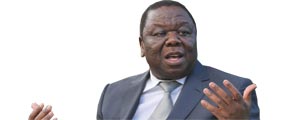
IN our edition yesterday, we published an article headlined “Bruising dogfight in Zim presidential elections”.
The piece analysed the weaknesses and strength of the country’s main presidential hopefuls – President Robert Mugabe, Prime Minister Morgan Tsvangirai, MDC leader Welshman Ncube, Deputy Prime Minister Arthur Mutambara and Mavambo/Kusile/Dawn interim president Simba Makoni.
Today, a special correspondent judges the candidates.
Mugabe: He has the simultaneous strength and weakness in relation to his long standing incumbency. It blights him because of his controversial and repressive record in leadership since independence, while it also makes him appear as the more experienced of the candidates.
He is, however, far removed from the lives of Zimbabweans, understanding the realities of their lives (water, health, education, technology, etc) and might not have his finger on the country’s real pulse, outside of the politicking.
This would be both due to age as well as general pre-occupation with the politics of his party and succession.
In matters relating to foreign affairs, he is weaker and even though he may be popular when he attends regional rallies, this popularity has not translated into any real foreign influence for Zimbabwe.
Where it comes to the national economy, he is more populist and short term in his approaches, and tends to couch economic policy in nationalist and identity-related rhetoric which may give temporary respite to his supporters, but hurts long term foreign direct investments and local industrial capacity.
- Chamisa under fire over US$120K donation
- Mavhunga puts DeMbare into Chibuku quarterfinals
- Pension funds bet on Cabora Bassa oilfields
- Councils defy govt fire tender directive
Keep Reading
His primary weakness remains his age which affects both his party’s succession problems as well as his ability to reach out to younger Zimbabweans with a vision that they would share.
Tsvangirai: His primary strength resides in his being the face and brand of, to the greater extent, successful opposition politics in post 1990s Zimbabwe and, therefore, his “long duree” in the same has made him quasi-Messianic (people tend to forget his flaws).
His major weakness is that he lacks decisiveness and generally appears malleable under pressure. He does not exhibit any long-term vision. He talks more of the immediate and demonstrates a somewhat personalised understanding of politics. He also does his politics by default with limited little planning and always resorts to populism where and when confronted by a crisis (rallies, wholesale dismissal of officials, etc).
Tsvangirai outsources strategic thinking via international organisations and takes advice coming from those he admires or those who have assisted him in the past, all at face value and with limited contextualisation.
He, however, stands a better chance of winning the presidency despite his flaws mainly due to the fact of his national popularity and the fact that for many Zimbabweans, Mugabe is no longer a viable option. Mutambara: He is a wily opportunist.
He, however, is least likely to run for Presidency, but will position himself behind a specific candidate in order to remain relevant or at least in a ministerial position after the elections. He is enamoured to his educational qualifications which he probably thinks entitle him to leadership positions in Zimbabwe. He is not a game changer and his candidacy would be viewed with humour and very little support by voters. Ncube: He has a stubborn streak once he makes up his mind about anything. Even if that particular decision goes against the grain/common political sense he will stick to it, not because of principle, but more simply because he made the decision.
Ncube has a tendency to pursue banal populist politics in his interactions with grassroots politics, including raising the ethnic injustice card on a regular basis and identifying closely with his own ethnic group of origin.
In relation to broad policies, like Tsvangirai he would be in the thrall of global think-tanks and most likely implement whatever the latter propose to him as is.
He also does not dot his ‘i’s and cross his ‘t’s in relation to policy implementation as evidenced by the disaster that has been the Essar deal. He is adept at “boardroom” politics as evidenced by his ouster of Mutambara from his party’s leadership and his eventual arrival at being viewed as some sort of a GPA principal.
If he were to become a presidential candidate, he would have support largely from the southern and middle provinces of the country, but it, again, would not be a game-changer for the presidency. Ncube is better off concentrating on running for Parliament and choosing to support either Mugabe or Tsvangirai. Contrary to popular speculation, he will not be as devisive as was Simba Makoni in 2008 when it comes to the presidential vote count.
He has too little support and does not have the backing of Zanu PF factions.
Simba Makoni: He does not demonstrate evidence of his experience in government since the 1980s and is too enamoured to NGO-related approaches to political issues.
Whereas he would have been an ideal poster boy for Zanu PF before he left that party, on his own he has not demonstrated clear political resolve and determination or organisational capacity to lead a political party/movement. Hence his own Mavambo has lost so many of its key players who have returned to the academic world or alternatively have re-joined Zanu PF.
Should he run for the presidency, he will not repeat the same level of support he garnered in 2008 because his movement is divided (if it still really exists) and also because the opposition vote will be further divided.







